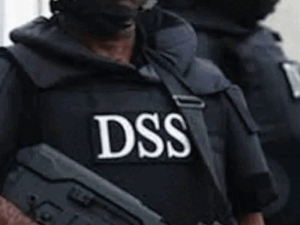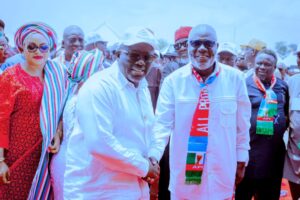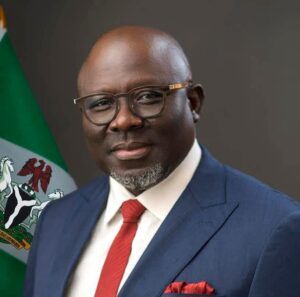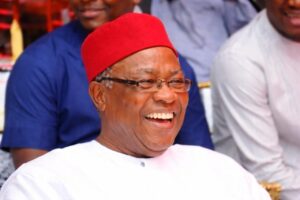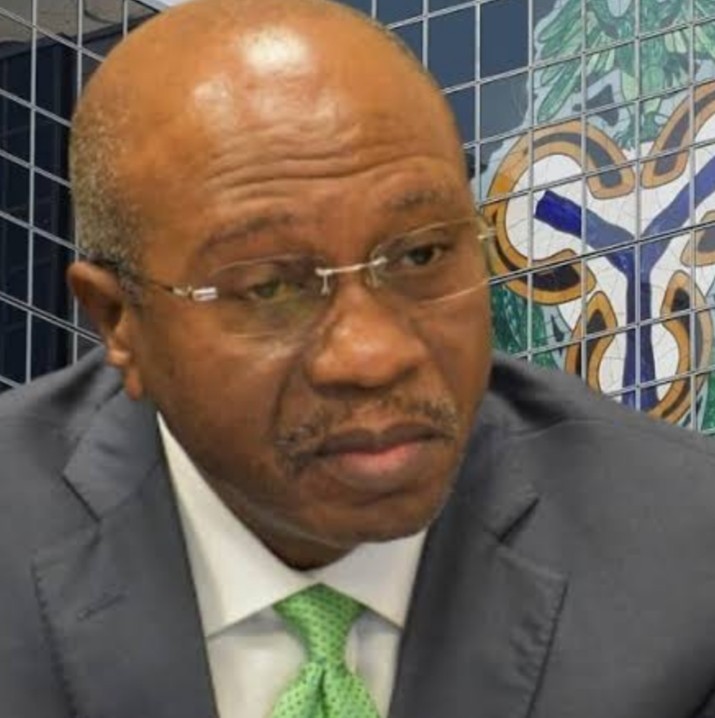
Godwin Emefiele, fmr CBN Gov
* Appoints Adebesi to act
By Jon Egie
Governor of Central Bank of Nigeria (CBN), Mr Godwin Emefiele has been suspended from office.
[the_ad id=”16914″]
His supsension was contained in a statement issued Friday night, by Willie Bassey, the Director of information in the office of the Secretary to the Federal Government (SGF), Senator George Akume.
The statement noted that the suspension was sequel to the ongoing investigation of his office and the planned reforms in the financial sector of the economy.
[the_ad id=”16918″]
“Mr Emefiele has been directed to immediately hand over the affairs of his office to the deputy governor (Operations Directorate), who will act as the CBN governor pending the conclusion of investigation and the reforms,” the statement said.
Following the suspension, it was learnt that officials of State Security Service (SSS) have also arrested him.
Credible sources around the presidency and the intelligence community said Emefiele was suspended because of many reasons, among them his recent role in naira swap and cashless policy that mopped up the entire money in circulation in the country, which nearly truncated the conduct of the 2023 general elections.
[the_ad id=”16917″]
Tinubu had, at the height of electioneering, said the naira policy was targeted at him, insisting that he would certainly win the election despite sabotage from official quarters.
Recall that Emefiele had at various times denied wrong doing, insisting he was discharging his responsibilities as provided by the law.
Some sources said Emefiele ought to have been suspended long before the exit of former President Muhammadu Buhari, but he was not.
The sources said they were all appalled by the ‘I-don’t-care-attitude of Buhari’ to all the facts, figures and incontrovertible indicting documents presented to him by various agencies over financial malfeasance of the suspended CBN governor.
[the_ad id=”16920″]
It was learnt that the SSS, the Economic and Financial Crimes Commission (EFCC) and many financial regulatory agencies, both at home and abroad, have issues to grind with the embattled Emefiele.
Various agencies had carried out investigation on Emefiele and submitted their reports to the immediate past administration for action but nothing was done.
“If anything, the last gift to Emefiele by the last administration was a national honour,” he said.
[the_ad_placement id=”advert”]
In February, Daily Trust reported that the SSS had stepped up investigations with a view to arresting and prosecuting Emefiele over allegations of terrorism financing and fraud.
An online platform, Premium Times, recently published some of the exclusive details it got from court documents on the controversy around the trail for Emefiele, among them funding “unknown gunmen” and members of the outlawed IPOB.
In the report by the online medium, Emefiele was also accused of sabotaging President Buhari’s administration, financing terrorism, aiding and abetting terrorism and committing other economic crimes to undermine Nigeria’s national security.
It also accused the CBN governor of mismanaging its subsidiary, NIRSAL and the bank’s Anchor Borrowers Programme.
The SSS alleged that Emefiele funded the IPOB/Eastern Security Network (ESN) with both the resources he raised for his failed presidential bid last year and funds diverted from government coffers.
[the_ad_placement id=”advert-1″]
Recall that a team of four lawyers from the legal department of the secret security agency filed its case (ex parte motion) against Emefiele on December 7, 2022, seeking permission to detain him for 60 days to conclude an investigation of his alleged atrocities.
However, on December 9 last year, a Federal High Court in Abuja declined the SSS application to arrest and detain the CBN governor.
In declining the motion of ex parte filed by the secret police, Justice J. T. Tsoho, the chief judge, said the agency did not provide any concrete evidence to substantiate its claims that Emefiele was involved in terrorism financing and economic crimes.
The court said that such an application should have been accompanied with the presidential approval because of the grave implications for the Nigerian economy if the CBN governor was arrested and detained.
[the_ad_placement id=”advert-2″]
Meanwhile, about two weeks after Justice Tsoho gave his order, Emefiele got another reprieve from a separate court as the Federal Capital Territory High Court granted a request by a civil society organisation to prevent his arrest.
Justice Muslim Hassan of the FCT court had ruled that based on Tsoho’s earlier ruling, “Any continuous harassment, intimidation, threats, restriction of movement, abuse of right of office, surreptitious moves to arrest and humiliation” of Emefiele, over “Trumped up allegations of terrorism financing and fraudulent practices” was illegal and unconstitutional.
The judge also restrained the SSS “from instigating the arrest or arresting, interrogating and detaining” Emefiele in respect of any matter or policy decision on the Nigerian economy “or for any connected purposes, except by an order of a superior court.”
[the_ad id=”16914″]
CBN Act, prohibits the federal government from sacking the CBN Governor and members of the board but has the right to appoint them with approval from both houses of the National Assembly.
But the CBN Act provides that when under criminal investigation or in case of mental health conditions, the CBN governor’s appointment can be terminated.
“The governor, deputy governor or director shall cease to hold office in the bank if he becomes of unsound mind o, owing to ill health, is incapable of carrying out his duties, is convicted of any criminal offence by a court of competent jurisdiction, except for traffic offences or contempt proceedings arising in connection with the execution, or intended execution of any power or duty conferred under this Act or the Banks and Other Financial Institutions Act.” The CBN act states.
The governor can also be removed if he “is guilty of a serious misconduct in relation to his duties under this act, disqualified or suspended from practising his profession in Nigeria by order of a competent authority made in respect of him personally; becomes bankrupt.”
The CBN act also gives the presidency power to terminate the appointment of the CBN governor, but it is dependent on lawmakers’ backing.
“The CBN governor can be removed by the president provided the removal shall be supported by two-third majority of the Senate,” the Act added.
[the_ad id=”16918″]
Reacting to the development, Professor Uche Uwaleke of the Nasarawa State University, said the suspension of Emefiele was long foretold.
“The president cannot sack the CBN governor, but he can suspend him, which is what he has done.
“Recall that Mr Sanusi Lamido Sanusi was equally suspended from office by the Jonathan administration.
This suspension will mark an end to a turbulent era.
“Godwin Emefiele will be remembered for implementing big ideas, such as the Anchor Borrower Programme, the RT200, the eNaira and a raft of interventions which helped to stimulate the economy during periods of economic recession.
To be fair, Emefiele, to a large extent, succeeded in ensuring financial sector stability going by the prudential ratios. His forex demand management policies, especially the 41 items not qualified for forex, promoted import substitution, conserved external reserves and ensured relative stability in exchange rates. It would be unfair to blame him for the current high inflation rate since most of the causative factors are beyond the control of the CBN.
“On the flip side, he will also be remembered for the currency redesign exercise which didn’t go down well with Nigerians, and the CBN Ways and Means which grew astronomically during his tenure.
[the_ad id=”16917″]
“His greatest mis-step was his attempt to join the list of presidential candidates. All said, I think he deserves some rest now,” he said.
Meanwhile, the Deputy Governor in charge of operations, Engr Folashodun Adebesi has been appointed to act as governor of the CBN.
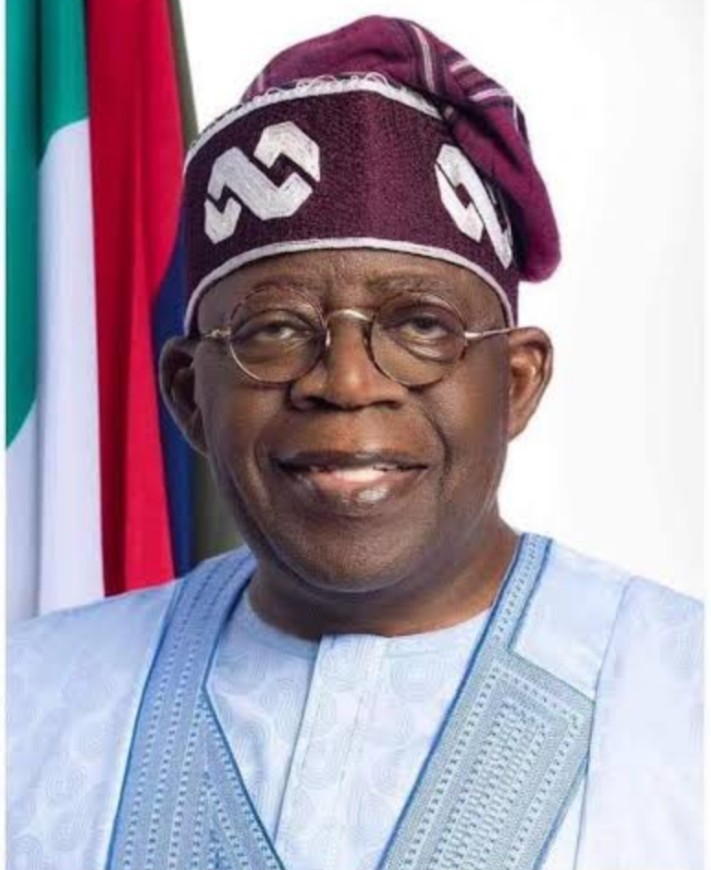
President Tinubu has been roundly hailed by Nigerians for the bold decision to suspend Godwin Emefie who caused untold hardship to citizens because of bad fiscal policies especially, the naira swap before the general elections.



